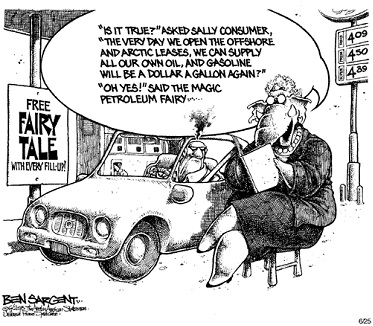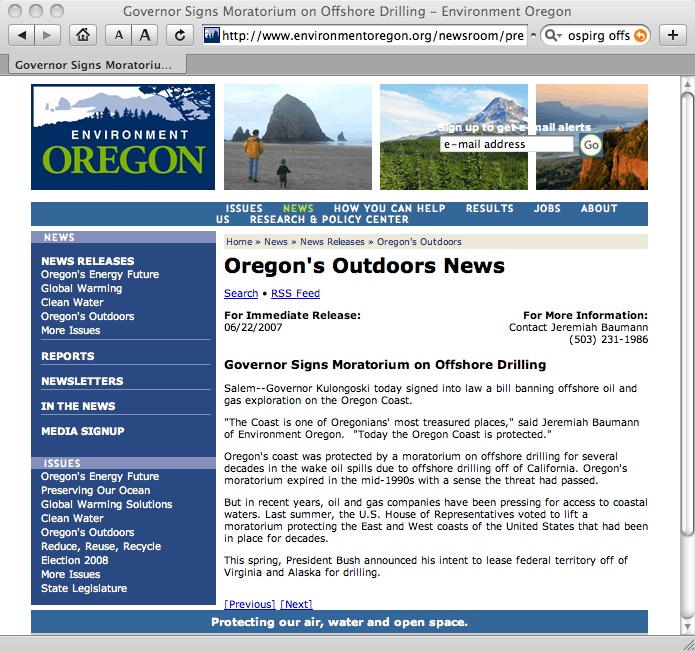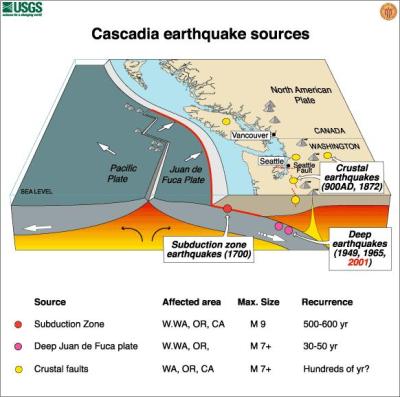Offshore Drilling on a Swift Boat
Geology is more important than the politics of blame
- Drilling Distractions: politicians ignore Peak
- Where offshore oil is - and is not
- more drilling won't reverse depletion
- Peak Oil Congressional Caucus - pandering instead of discussing Peak
- environmentalist campaign to stop oil drilling in area without oil
www.theoildrum.com/node/4521#comment-406957
super390 on September 12, 2008 - 10:54pm
"All the offshore oil is in the path of hurricanes. God must be trying to tell the faithful something."
 written summer 2008:
written summer 2008:
The Obama and McCain campaigns misled the public about the need (or not) to increase domestic drilling in the United States.
Very few voices -- none in the presidential campaigns - dare to say any of these truths:
The US peaked in oil extraction in 1970, just as M. King Hubbert predicted in 1956, and we are now just past peak for world oil extraction. The largest oil fields in the US have been drilled for a long time. There are some more oil fields yet to be drilled, but they are generally lower quality (Bakken in North Dakota and Montana) or very difficult to access (Gulf of Mexico deep water, Arctic National Wildlife Refuge). No amount of new drilling rigs can change geological reality.
"Offshore" oil is becoming a bigger percentage of the total supply, a clear indicator that the easy to get oil that is on shore is winding down. The Saudis are increasing "offshore" drilling in the Persian / Arabian Gulf, a strong hint that they are having problems maintaining production at their existing, on shore fields. Off shore drilling in West Africa is also increasing (especially in the newer fields of Equatorial Guinea).
Drilling off shore, whether in relatively shallow or deep water, requires much more energy, resources, technical expertise and money than drilling on land. No oil company with easy access to onshore oil fields would chose offshore drilling unless it was required to keep up production levels.
Peak Oil is the real issue, and we need a compassionate, sane approach to dealing with it. Neither Obama nor McCain will mention Peak Oil - and even Ralph Nader claims the problem is the alleged need for more refineries (although what oil company will invest in refineries to process oil that does not exist? the only new refineries likely to be built are those that can handle heavy, sour oil and tar sands sludge).
 The fake debate about offshore drilling in the 2008 Presidential Selection is the predicted consequence of our political and media systems staying quiet about Peak Oil.
The fake debate about offshore drilling in the 2008 Presidential Selection is the predicted consequence of our political and media systems staying quiet about Peak Oil.
It is sad that most of the "progressives" and liberal Democrats and even most of the "alternative media" have done little or no education about the geological realities of oil supplies. Now we see the consequences.
Politicians like to tell the voters there will have "more." Peak Oil means that the future will have "less." It's a bummer, so it was ignored. Now, it's harder to ignore, but the D's have decided they would rather have the R's frame the issue rather than talk about Peak Oil and the limits to endless growth on a finite planet.
The area offshore that has lots of oil is already being drilled (Gulf of Mexico). Clinton Gore tried to expand it to include some more marginal areas off the gulf coast of Florida, but Jeb Bush fought it since it would ruin their tourism industry if there was a big spill. Most of the areas in the United States that are NOT being drilled do not have oil, or at least have very little oil (barely enough to justify the enormous expense).
The bottom line - nearly all known reserves of offshore oil in the US are in the Gulf of Mexico, in areas that have been drilled for decades.
This map from the Minerals Management Service, which is in charge of leasing US waters for oil extraction, shows that nearly all of the "offshore" oil is already in areas that are legal to extract. This map shows figures for oil that MIGHT be discovered some day (or might not).

Charlie Hall: How much oil and gas will increased drilling provide? Geology's Answer: Not Much.
Posted by Nate Hagens on August 15, 2008
While this article ignores Peak Oil (the real reason "more drilling" is a bad joke), the broader point is valid - "offshore" drilling is propaganda to divide and misdirect, since most of the "offshore" oil is in the Gulf of Mexico where drilling is allowed. Symbolism, not substance (as usual).
www.bloomberg.com/apps/news?pid=20601039&refer=columnist_berry&sid=air._Othgtuc
Offshore Drilling Claims Are a Political Hoax: John M. Berry
Aug. 1 (Bloomberg) -- It's absurd to argue that ending the moratorium on drilling off parts of the U.S. coasts would quickly bring down the high price of gasoline.
This chimera is being touted by President George W. Bush and other Republican politicians, including the party's presumptive presidential nominee, Senator John McCain of Arizona, to deflect blame for what it's costing for a fill-up.
To get around the fact that it would be a decade or more before any oil would be likely to flow, a few partisan analysts have said that the cost of gasoline would fall right away. They argue that the prospect of additional oil supply in the future would lead oil companies to produce more oil immediately because they would expect prices for crude to be lower later on.
Well, wouldn't that depend on whether a producer had the capacity to pump more oil today, and whether it thought lifting the moratorium would add a significant amount of oil to future supply relative to future demand?
There are good reasons to question whether another 1 million or 2 million barrels of crude a day would make much difference in prices when world consumption is running at 85 million barrels a day.
About a fourth of all U.S. oil production is already coming from offshore wells, primarily in the central and western portions of the Gulf of Mexico that aren't covered by the moratorium.
In a May 2007 forecast, the Interior Department's Minerals Management Service, which oversees exploration and drilling on the outer continental shelf, said that oil production in the Gulf was likely to increase from 1.3 million barrels a day last year to about 2 million barrels by 2010.
Ignored Forecast
In other words, production was expected to rise by about 700,000 barrels a day over a three-year period. That would be a gain of about 14 percent over the 5.1 million barrels produced daily last year in the U.S.
Yet somehow that sort of forecast based on industry projections and announced discoveries had no discernable impact on world crude oil prices.
Why would anyone assume that opening other coastal areas -- which may or may not harbor large quantities of oil that might or might not be economic to produce sometime in the future -- will have an immediate impact on today's oil prices?
Nevertheless, the assertions continue: lift the moratorium and gasoline prices will fall. And since McCain's Democratic opponent, Senator Barack Obama of Illinois, is opposed to ending the moratorium, he therefore is responsible for high gasoline prices.
Dry Holes
Drilling proponents point to an estimate from the Minerals Management Service that there are probably about 76 billion barrels of oil waiting to be discovered offshore.
The problem is that little of that oil -- perhaps about 18 billion barrels -- lies in areas subject to the moratorium. A third of the total is off the coast of Alaska, where drilling is extraordinarily difficult and expensive, and most of the rest is in the Gulf of Mexico where drilling is permitted.
Some 3.5 billion barrels in the Minerals Management Service estimate are off the Atlantic coast in the Baltimore Canyon, an ideal geologic formation in which to find oil. It runs from east of Cape Cod all the way to North Carolina.
Beginning in the late 1970s, huge tracts were opened for exploration and oil companies jumped at the chance to drill. About 35 wells were sunk off Cape Cod, New York and New Jersey at a cost, including purchases of the leases, of almost $3 billion.
The result? Nothing. Neither oil nor gas was found.
Giving Up
Another ideal formation, the Destin Dome, in the eastern Gulf Coast area off Pensacola, Florida, was another major disappointment. Exxon Mobil Corp. spent heavily to acquire leases and found no commercial quantities of oil or gas in what became known as ``Dusty Dome.''
Years later, natural gas was found in the Dome. Yet, as a result of political pressure generated by environmental concerns, oil companies were paid to give up their leases. The gas has never been produced.
At a July 15 press conference, Bush said that he had lifted an executive order that had restricted offshore drilling since the early 1980s. Now, he said, ``the only thing standing between the American people and these vast oil resources is action from the U.S. Congress.''
Fooling the Public
Republicans are hoping that the public, believing their foolish claims that drilling will lower gasoline prices, will put enough pressure on Democratic opponents during the August congressional recess that begins today to pass legislation to end the moratorium this fall.
Meanwhile, both Bush and congressional Republicans have refused to take a step that really could reduce gasoline prices. That is to release a portion of the light, low-sulfur crude in the U.S. Strategic Petroleum Reserve.
In an earlier column I explained why that action might bring down prices in a way opening more environmentally fragile coastal waters to more drilling can't. Obviously Bush, McCain and their allies would prefer to mislead the American people and escape blame for effects of their past lack of action on the nation's energy problems.
(John M. Berry is a Bloomberg News columnist. The opinions expressed are his own.)
To contact the writer of this column: John M. Berry in Washington atjberry5@bloomberg.net
Last Updated: August 1, 2008 00:02 EDT
www.kunstler.com/Grunt_drill.html
We should drill drill drill -- because once we give the go ahead for this, we will discover the hard way that it will not solve our oil problem. ...
... this will never offset the depletion occurring throughout the world plus the steep fall-off in exports from Saudi Arabia, Mexico, Venezuela, Russia, and the North Sea that have already commenced.
We also don't have fifteen years to prop up the systems we are currently running for everyday life, including suburbia, Happy Motoring, the airline industry, Big Box Shopping, just-in-time food deliveries, air-conditioning places like Phoenix, Houston, Orlando, and Las Vegas, heating one-story sprawling centralized schools and fueling the yellow bus fleets that service them. . . . You get the picture? All this stuff is toast. And so is the economy that accompanies them.
By the way, forget about oil shale and the Dakota "Bakken" oil play as anything more than pipe dreams by people who don't understand the economics of oil production or geology.
Is there anything we can do?
Of course... and I've repeated it a hundred times
- Rebuild the passenger rail system (and public transit at all scales) with electrification
- Prepare to reinhabit our small cities and small towns, while decanting the suburbs and our supersized metroplexes
- Grow much more of our food locally around these places
- Rebuild local networks of retail and wholesale trade
- Prepare to resume manufacturing at smaller scales
- Raise interest rates to reward savings
- Do not waste alt.energy production on automobile use
Mark Udall, Democrat of Colorado and Tom Udall, Democrat of New Mexico, are among the most liberal and environmental Members of Congress. They were founding members of the Peak Oil Caucus in 2005, so he is aware of the underlying geological issues of oil supplies. Despite that knowledge, in 2008, while they were each running to become Senators (while gas prices spiked), they chose to patronize the public with support for "off shore drilling" rather than fire back with telling the truth about Peak Oil.
In 1974, Rep. Mo Udall, father and uncle to the two Udalls currently in Congress, invited M. King Hubbert to testify. If any politician knows about Peak it is the Udals - yet when pressed they decided to endorse "more drilling" instead of honest discussion of limits.
It looks like it is completely taboo for Democrats to mention Peak Oil as the underlying reason for the energy crisis, even if they privately know it.
www.denverpost.com/politics/ci_10194734
Udall reverses opposition to offshore drilling
The Democratic candidate for the Senate joins his party in trying to neutralize the GOP's strength on the issue.
By Michael Riley
The Denver Post
Article Last Updated: 08/14/2008
Battered on the energy issue for weeks, Democratic Senate candidate Rep. Mark Udall moved Wednesday to close the distance with his Republican opponent on the issue, calling for more domestic drilling and reversing his long-standing opposition to drilling off America's shores.
Both were sharp turnarounds for a man who has made the expansion of renewable energy a cornerstone of his career and who has consistently dinged the aggressive drilling policies of the Bush administration during this campaign.
But both Udall and his staff emphasized that the nation's energy crisis called for a sweeping rethinking of possible solutions — and that the country could no longer afford to keep much of anything off the table.
www.fromthewilderness.com/free/ww3/112305_peakoil_caucus.shtml
PEAK OIL CAUCUS FORMED
IN U.S. HOUSE OF REPRESENTATIVES:
A NEW BEGINNING AS THE CLOCK RUNS DOWN
By
Jamey Hecht
November 23, 2005 1300 PST (FTW): The House of Representatives now has a Peak Oil caucus. That means there is a conscious minority within that body who have recognized the crisis. Some of them probably understand it better than others, and perceive that no combination of alternative energy sources will ever allow what Dick Cheney calls “the American way of life” to continue. But they will educate each other and, we can hope, the rest of the House.
The Caucus was founded by Roscoe Bartlett, whose leadership on the Peak Oil issue is unparalleled across the entire government today. ....Congressman James McGovern
Congressman Vern Ehlers
Congressman Tom Udall
Congressman Mark Udall
Congressman Raul Grijalva
Congressman Wayne Gilchrest
Congressman Jim Moran
Congressman Dennis MooreHenceforth it will be much harder to pretend that fossil fuel scarcity is merely the result of market forces, Islamic extremism, corporate price gouging, international hoarding, technological limitations, or regulatory red tape. Those factors affect pricing, but geology trumps them all. Of course the beast in the Oval Office and his allies in the Congress will keep on pretending, just as the Soviets kept up the fantasy that “dialectics” would guarantee an eventual triumph of world communism, or as the Chinese during the “Boxer Rebellion” convinced themselves that martial arts could outface the machine gun. The distractions and deceptions will continue, but now there is a critical mass of thinking persons inside the government who can speak the truth about the energy crisis. Not a lone visionary, vulnerable to dirty tricks or a convenient plane crash – this is a group of eight legislators of both parties from Massachusetts to New Mexico. The game has changed.
A few years ago environmentalists campaigned to stop oil drilling off the Oregon coast, an area that does not actually have any oil (it's the wrong geology). That way they "won" their campaign without actually stopping anything, which keeps industry very happy.
One of the campaigners behind this effort claims that there might be a small amount of oil off the coast, and in the future, methane hydrates might be mined from the sea floor, so the drilling moratorium is still a good idea. Perhaps one day, methane hydrate extraction might become a major threat to the coast (and to the climate, since methane is a potent greenhouse gas). However, searching for "peak oil" on the "environmentoregon.org" website turns up a blank result. Most of the foundation funded environmental groups act as de facto divisions of the Democratic Party, and since the Democrats don't want to talk about Peak Oil, these groups ignore it, also.


the coast off the Pacific Northwest is a Subduction Zone,
which is not a geologic formation that creates petroleum traps
whatever fossilized algae may have been deposited there eons ago
was ejected out of the Cascades volcanoes




